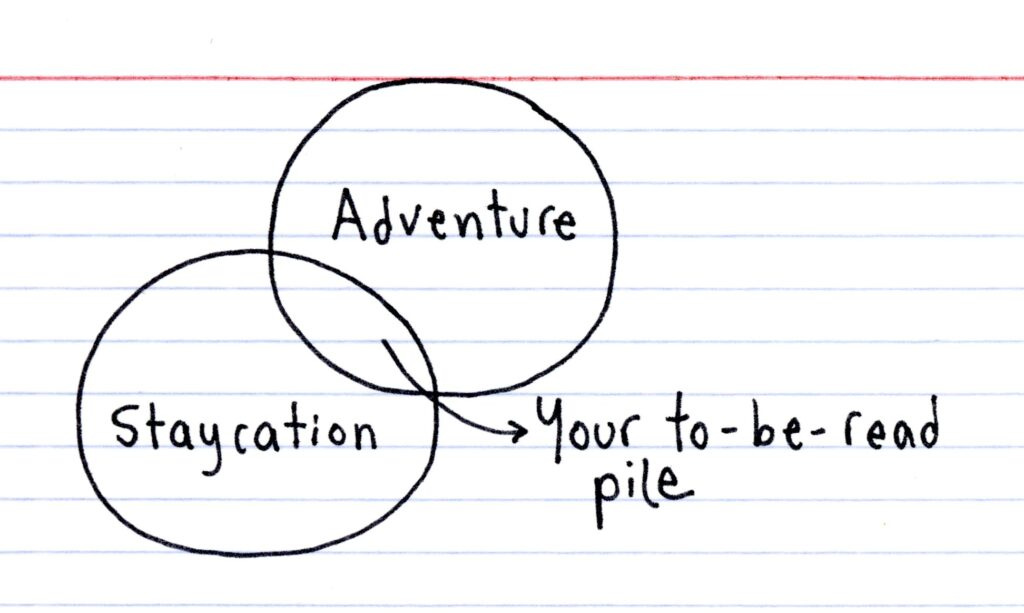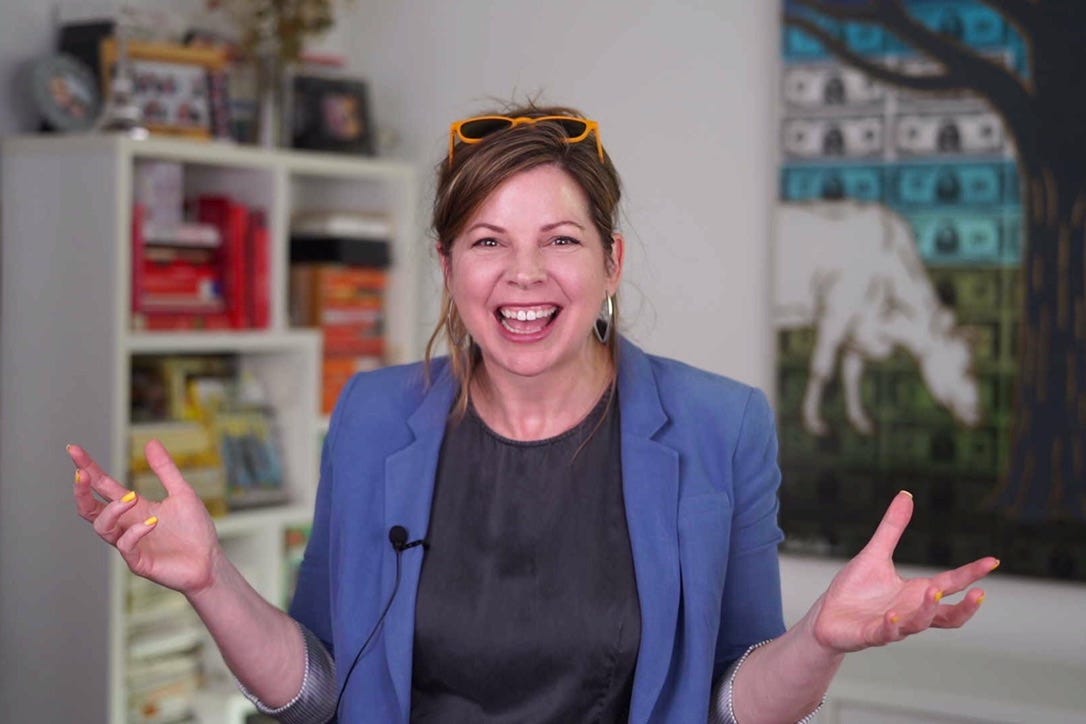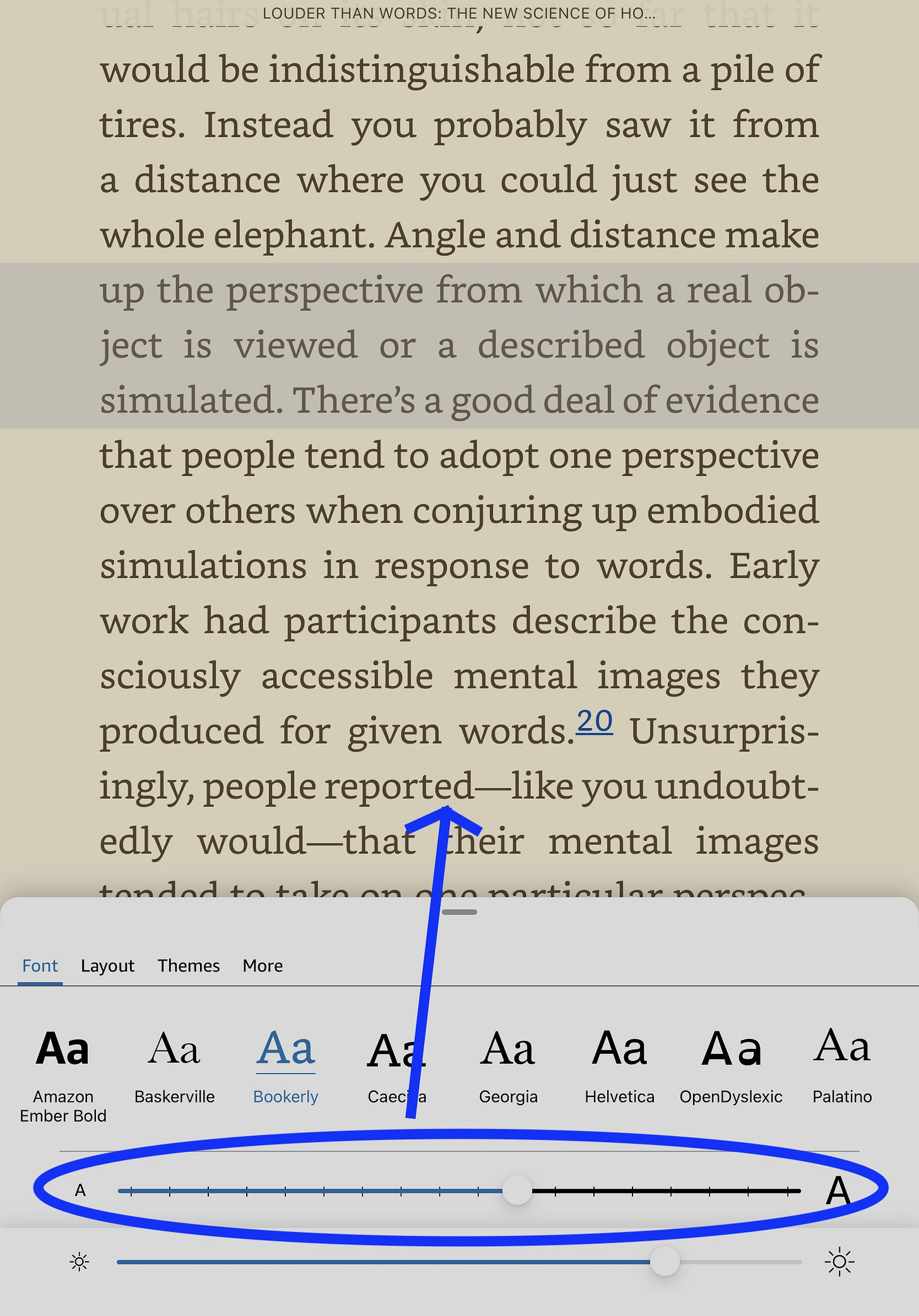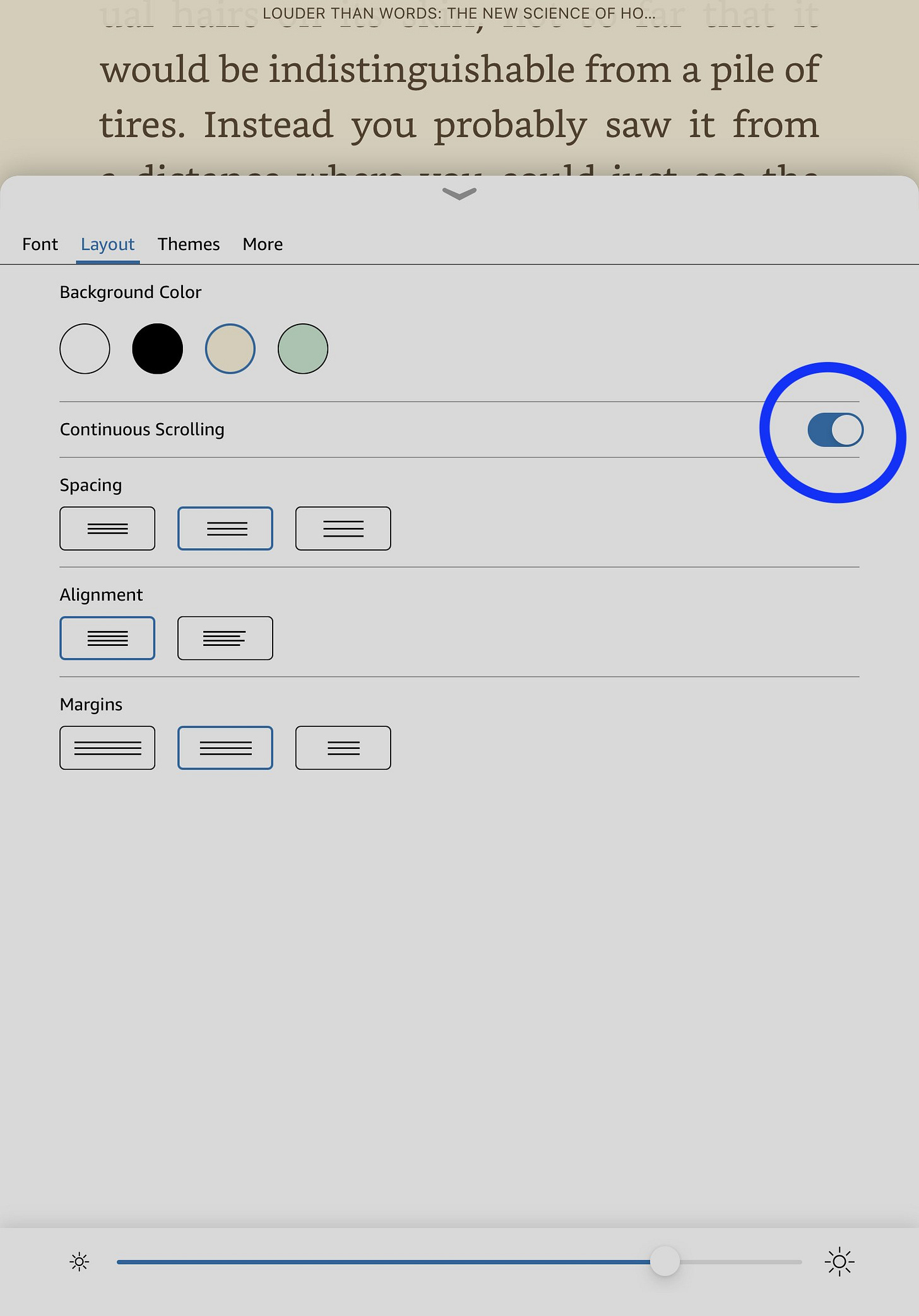How to read — like, a lot.
Like, 100 books a year. Or more. As much as you want! I break down the systems and approach that work for me.
I’ve just finished my 100th book for 2022.
Well, at least. This is a Goodreads screenshot. I read on Kindle, which has its own counter, and it’s higher! It says I’ve read 103 books this year (so I missed syncing something up at some point).
I've always been an avid reader but in 2021 I bought an 11-in iPad Pro, organized my Kindle books, tweaked the settings, and since then have been finishing a lot more books. Sometimes averaging a book per day, sometimes finishing two or even three in a single day.
What was I reading in 2022?
Well, let’s see. You can see the whole list at Goodreads, but I’ll share some highlights. I’m big on nonfiction and I always crave brain food, so this year that’s meant a deep dive into philosophy, like finally getting around to reading The Ethics of Ambiguity by Simone de Beauvoir. I loved that book, and her writing made me desperately want to be a better thinker, which is just about the highest praise I can offer.
Some of the books I read in 2022 were long-form investigative journalism about large-scale systems like the supply chain (Arriving Today: From Factory to Front Door -- Why Everything Has Changed About How and What We Buy by Christopher Mims, whom I also interviewed on The Tech Humanist Show), or concerning patterns of Soviet political history (Surviving Autocracy by Masha Gessen).
As I continue to research and think about solutions for a brighter future, I wanted to commit myself to exploring and understanding more of the intersection of history, economics, and policy:
On Tyranny: Twenty Lessons from the Twentieth Century by Timothy Snyder
The Good Society: The Humane Agenda by John Kenneth Galbraith
The Little Book of Economics from D.K. Publishing
along with some practitioner texts that go into design of policy and interventions for climate and energy (I mostly skimmed these; I just wanted to have familiarity with the concepts):
Some of my 2022 books were about how we interact with the world, such as The Architecture of Happiness by Alain de Botton, or The Poetics of Space by Gaston Bachelard. Both are wonderfully challenging and engrossing reads full of vivid ideas about how space and place affect us.
As a fun aside, I also got on a coffee kick! It started when we had A.J. Jacobs on The Tech Humanist Show to talk about Thanks a Thousand: A Gratitude Journey, where he endeavors to thank 1,000 people involved in the production and supply of his daily coffee. After reading that I had a second helping with The Devil's Cup: A History of the World According to Coffee by Stewart Lee Allen — a wild ride! — and chased it with a shot of New York City Coffee: A Caffeinated History by Erin Meister.
Of course I always read a steady flow of books about the speaking craft and business, and about writing, as well as about running a business. Two of those that stood out were The Win Without Pitching Manifesto by Blair Enns and The Business of Expertise: How Entrepreneurial Experts Convert Insight to Impact + Wealth by David C. Baker, both of which I had at least skimmed before but which go together as a one-two punch with a lot of shared material. In fact they both reference the other, acknowledging that Baker and Enns have worked together so much for so long that they no longer know whose ideas are whose. That’s kind of a neat thing to experience as a reader.
I don’t read a lot of fiction, but I did enjoy The Dictionary of Lost Words by Pip Williams and What We Talk About When We Talk About Love by Raymond Carver. They were each lovely, delicious, and a wonderful brief escape for a weekend or so.
Another kick I’ve been on this year was digging into science and math from various angles, and in fact my absolute favorite book of the year — the one that blew my mind, made me cry, and made me swear to re-read it over and over — was a physics book: Seven Brief Lessons on Physics by Carlo Rovelli.
"What role do we have as human beings who perceive, make decisions, laugh, and cry, in this great fresco of the world as depicted by contemporary physics? If the world is a swarm of ephemeral quanta of space and matter, a great jigsaw puzzle of space and elementary particles, then what are we? Do we also consist only of quanta and particles? If so, then from where do we get that sense of individual existence and unique selfhood to which we can all testify? And what then are our values, our dreams, our emotions, our individual knowledge? What are we, in this boundless and glowing world?"
Thank you, Carlo Rovelli, for the year’s most inspiring read.
Kicking up your own reading
Perhaps you’d like to commit to reading more in 2023. I recommend it! Whenever I talk about my voracious reading habits, people have some common questions, so I’ll try to anticipate those and cover them here.
“How on earth do you find the time?”
I read a little in the morning and a little at night, a lot on flights and in airport lounges waiting for flights, and at the gate waiting for the flight, and then back at the lounge when the flight has been delayed, and so on. There was a lot of that this year. But also on the subway, and so on. Wherever there’s time for what might otherwise be doomscrolling. Sometimes between meetings, when I have 5 minutes I might read a few paragraphs before a call starts. In some cases it's also reading as research, so some of it is during the day, alternately reading and writing. When I am trying to write and I hit a wall, sometimes I’ll read for a few minutes until a word hits me the right way and an idea strikes — and it somehow always does! — which gets my own words flowing again.
It's also dozens of books in progress simultaneously, which has been a source of wonderful crossover observations. That bit from the book on how the brain works dovetails in an interesting way with this section from the history of Western philosophy, etc etc.
And that's the thing about this: my writing has become more prolific too. It’s like a personal perpetual insights machine.
“How do you keep track of what you’ve read?”
Both Kindle and Goodreads keep track of the finished book count for me, so that’s covered. (Although there can be some discrepancies, so I let Goodreads be the authoritative count since it’s shared with friends.)

“How do you acquire such a huge library of Kindle books to read?”
I keep notes in Evernote of books people recommend in everyday conversation or that I see that interest me.
I take a few minutes every week or two to add the Kindle versions of books I’m interested in from this list and from other sources to an Amazon wishlist, and then I check it nearly every day for price drops to $1.99, $2.99, or sometimes even $0.99.
I use BookBub to buy Kindle books that match my interests when they’re on sale for those sorts of prices.
My Kindle library represents YEARS of just these first few steps: having collected books when they’re on sale or when I periodically review my wishlist for price drops.
But there’s also:My friends include a lot of authors, and I always buy at least a Kindle copy of their books to read and review, as well as often multiple print copies to give away.
Sometimes I buy books my favorite authors release (like Rebecca Solnit). Or sometimes I buy a book when I hear an interview with the author, like How to Stand Up to a Dictator by Maria Ressa, who won me over when she was on The Late Show with Stephen Colbert. I’ve got that one in my read-next list.
“Why Kindle? Why use an Amazon platform at all?”
The short answer is: after loads of experimentation, this way just works for me. I make a lot of tradeoffs to minimize my entanglement with Amazon, but the ability to read a lot and have it all work is just too important for me to trade off.
“Why not e-books from libraries?”
Yes, I'm an ardent fan and supporter of public libraries in general and the NYPL in particular. But the e-book reading experience on any of the library-supportive apps isn’t anything like Kindle and its integration with Goodreads, Readwise, Evernote, and all the other pieces of the ecosystem I have working for me now.
I love going to a library in person and spending hours just reading and working in the presence of so much literary gravitas. I still do that, and I attend NYPL programs and contribute financial support to the NYPL. But my actual reading works best this way.
“Why not buy print books?”
My eyesight is diminishing with age, and I find the print of paper books too small for comfortable reading. I’ve also struggled with hand and wrist strain issues for decades, and I find the way I have to contort my hands to hold a book is far more straining than the way I hold my iPad.
I fully admit, though, that thumbing through my iPad doesn’t help at all with providing a lovely background for my virtual keynotes that these physical bookcases do:
But then again I like having a personal library of LOTS and LOTS of books, and alas I do not possess the trillions of dollars per month it would take to house a personal library like that in midtown Manhattan, so Kindle on an iPad it is.
“OK, so how do you organize your Kindle?”
Within the app and on Amazon's "Manage Content and Devices" page, I occasionally sort the books into categories by topics (and statuses, like "0Currently Reading") and then have used the "Collections" view to keep them easily at hand.
“How do you read so MUCH?”
Here’s another perspective — some of the tweaks I’m describing throughout this post are similar in some way to what @IAmMarkManson shares in this video (note pirate language, which is on-brand for Mark):
“How do you read so FAST?”
For me, what works is a combination of 1) learning to read quickly for key concepts while allowing myself to slow down and soak it up when the writing is really worth it, 2) trusting my review process (more on that in the next section), and 3) having my Kindle settings like this:
a) I have the type set quite large. My aging eyes now need reading glasses when I look at most print books, so this is a built-in advantage of e-reading.
b) I’ve turned 'Continuous Scrolling' on — MAJOR accelerator over the ‘page flip’ animation — and c) turned on "Reading Ruler." Easier to pick back up after I set it aside.
“How do you retain/revisit what you’ve read?”
Super important! This part is key.
I make notes in various ways (and that’s probably worth its own entire post) but the best ‘hack’ I can possibly share is that I use Readwise to review my highlights, which helps me read quickly with confidence, knowing that I’ll be able to review what matters.
Each day, as I review my highlights (which can take as little as 3-5 minutes or you can spend longer if you have it), I add tags, which helps me go back through them when I want to make connections across books I’ve read.
For example, say I click on “consciousness” in the example screenshot from The Poetics of Space. It would take me to a page with all of the highlights I’ve tagged with consciousness, offering me a lovely little opportunity to ruminate on consciousness from varying points of view:
I currently have it set up to show me 5 highlights per day, slightly biased toward older highlights over newer ones, and with bonus highlights and quality filter turned on.
“How can you read more without, y’know, feeling bad about it?”
Reading should be a joy, but the catch is: to the extent you want it to be an escape, you’ll need to carve out time from your “pleasure” budget.
If you want reading more to make sense within the real time budget constraints of your life, then you’ll want to make sure a good chunk of what you read supports what you are trying to do at scale, what you need to learn, what new thoughts you want to have.
The writer studies literature, not the world. He lives in the world; he cannot miss it. If he has ever bought a hamburger, or taken a commercial airplane flight, he spares his readers a report of his experience. He is careful of what he reads, for that is what he will write. He is careful of what he learns, because that is what he will know.
— Annie Dillard, The Writing Life
And get this: when you choose your material well, it’s still a joy! Good writers are a joy to read, no matter what they’re writing about.
You’ll need some kind of system — some kind of tools and a process — to make it effective enough that you don’t feel like you’re taking away from what you should be doing. If you’re choosing your reading so that it supports your life goals and you can draw value into the rest of your life, it is what you should be doing.
That’s it! Read on, good reader. Share your reading goals (or any other questions) in the comments! I’d love to read all about them.












THIS post is AWESOME!!
Loved this post especially Readwise. Excellent tips